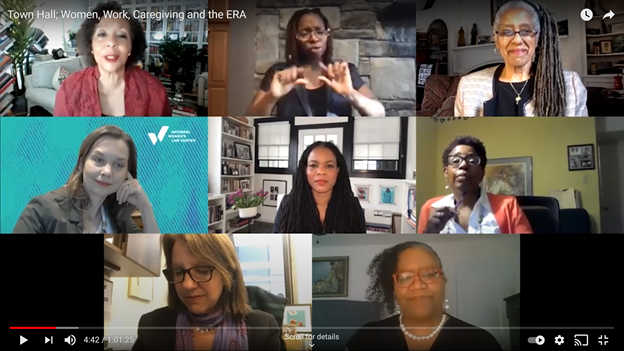Leveling the playing field with the ERA for Women in Sports
February 04, 2026
By Ava Lee-Green
The ERA Coalition held a town hall on March 23, 2021 which focused on women, work, and caregiving. The discussion is part of a series of virtual conversations supported by the Harnisch Foundation.
The event was opened by Carol Jenkins, President and CEO of the ERA Coalition and Fund for Women’s Equality, who welcomed and introduced the panelists. She then turned over the microphone to the moderator, Dr. Dionne Dobbins, Sr. Director of Research at Child Care Aware of America.

The effect of Covid-19 on working women
The conversation opened with Dr. Dobbins and Dr. C. Nicole Mason, President and Chief Executive Officer of the Institute for Women’s Policy, who both discussed the fact that one-third of working women have been forced to leave work due to decreased access to childcare. Many of these women were struggling to receive flexible work hours and access to childcare, but the pandemic has exacerbated this issue. Additionally, the pandemic has hit many lower paid workers who do not receive benefits such as health or dental care. Dr. Mason alluded to UNICEF’s “Building the Future Report,” which outlines sustainable strategies that will help remedy this systemic problem.
Emily Martin, Professor of Sociocultural Anthropology at New York University, continued the discussion by introducing the discrepancies between White women and women of color in the U.S. Currently at a 14% unemployment rate, Black women are disproportionately unemployed compared to other groups of women.
“There’s a real possibility,” she said, “that this pandemic isn’t just an economic hit that women and families are feeling right now, but one that can have an impact for many years with a potential increase in gender wage gaps and racial wage gaps.”
Mary Williams-Stover, Executive Director at NC Council for Women, specifically focused on what she has seen in North Carolina. Women have been falling through the cracks of the healthcare system, and domestic violence organizations have not been able to host fundraisers to raise money. Many programs are not available to immigrants, so they must be included to ensure they receive the help they need.

Why are unions important for women?
Dr. Elise Bryant, President of the Coalition of Labor Union Women, began her answer by stressing that working women must be a part of the solution discussions, especially ones that will directly affect them. She explained that unions are important to women because they help raise the standard of living. Union workers have had fewer job losses during the pandemic compared to nonunion workers.
Union women typically earn higher wages than nonunion women, especially for Latinas, who on average earn the lowest wages in nonunion jobs. Women are joining more unions due to lack of affordable healthcare and childcare. However sexism and lack of flexible work hours, among many other issues, have created barriers that prevent women from rising in the workplace.
How will the Child Care Tax Credit help families?
Dr. Mason spoke on how the Child Care Tax Credit will help pull children out of poverty, potentially cutting the poverty rate by 40%. “The social safety net has continued to erode, and now it’s virtually non-existent. We’re paying the cost of not having a social safety net during the pandemic.” She emphasized that this policy should be made permanent because it provides cash to parents monthly who are working at low-paying jobs.
Menstrual equity and the Pink Tax
Jennifer Weiss-Wolf, Vice President of the Brennan Center for Justice, talked about how current policies regarding menstruation are not suited for the pandemic. Part of the fight over the years has included ensuring that menstrual products are available in schools; this is currently only mandated in six states. There is also a need for access to menstrual products in shelters and other places that house survivors of sexual assault and domestic violence.

Weiss-Wolf continued by bringing up the Pink Tax, a discriminatory practice in which companies charge more for products that are specifically marketed for women. For example, menstrual products (which are a necessity) are not exempt from sales taxes.
She concluded her response by connecting it back to the ERA. The amendment would help combat the pricing structures that heavily tax menstrual products. The ERA would prevent advocates from having to fight these systems state by state and instead bring the issue to the national level.
How will the ERA help the issues around women, work, and caregiving?
Many of the panelists emphasized that by changing the language in the Constitution, the ERA will help ensure that women have equal rights to men. The ERA is a starting point for change and will provide a system where women can thrive. Emily Martin added that pregnancy discrimination is a topic that has not been covered in many court cases, and the ERA would combat this omission. “...[T]hat’s really our vision. To have a place where all women can thrive and to have a system that supports women equally.” Mary Williams-Stover said.
What are some immediate ways people can help raise awareness of problems that were brought about during the pandemic?
One immediate action people can take, Martin explained, is to have discussions about equitably delegating caregiving tasks among household members. Dr. Mason also encouraged people to stay informed about these issues and contact their elected representatives asking them to support fairer policies regarding women, work, and caregiving.
Carol Jenkins concluded by thanking all of the panelists for the extraordinary conversation.
Resources:
You can watch the full video of the town hall here if you missed it!